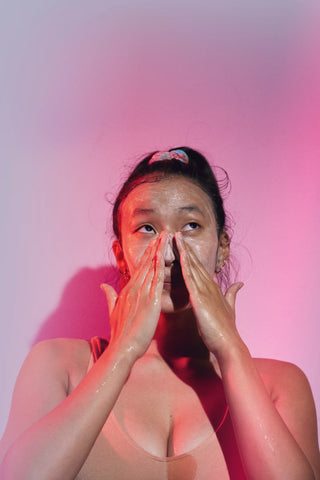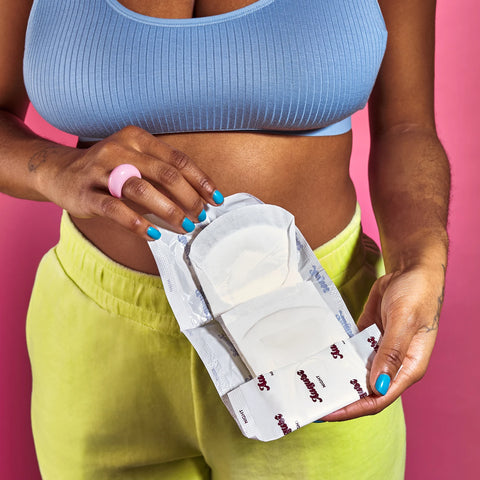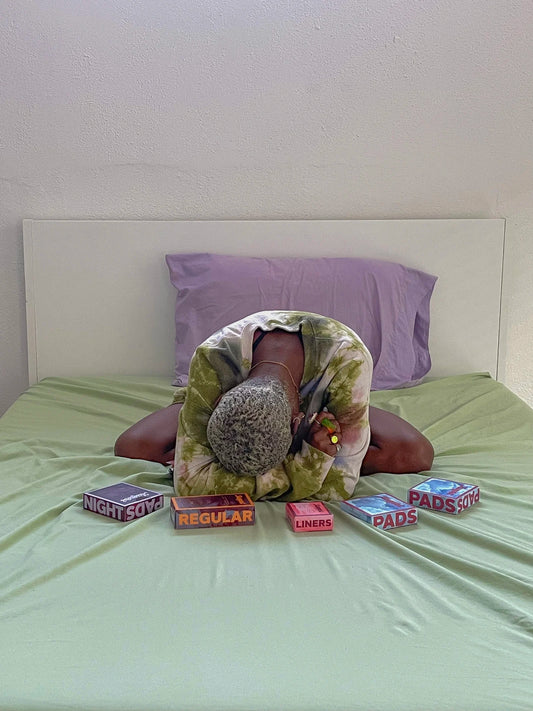How to get through another Blue Monday on your period.
Whether it’s seasonal depression, ongoing mental illness, or just that time of the month when your hormones fluctuate and emotions forget how to regulate – we’re here for you.
Thanks to Dr. Lea Lis (she/her), MD, Psychiatrist, we’ve compiled answers to a list of commonly asked questions about mental health and menstruation.
We hope that they will give you some understanding about what is going on inside your body, as a menstruator, to make you feel the way you feel.
Disclaimer: if you are consistently in a low mental state, particularly when off your period, please seek out support from a mental health expert. You’re not alone and there are solutions! You just need to find them.
Let’s get into it.
Why do I have mood swings on my period?

The menstrual cycle is driven by hormonal changes. These have different effects on different people. In some menstruators, moodiness is a side-effect of these hormonal changes.
4 Phases of the Menstrual Cycle
-
Menstruation: When the uterus sheds its lining and flows out of your vagina. An average period is 3-7 days. You may find yourself feeling fatigued so go easy on yourself <3
-
The Follicular Phase: Starts on the day that your period starts and lasts for up to 2 weeks. In this phase, you’ll feel extra confident – go get ‘emmm!
-
Ovulation: When the mature egg is released from an ovary and travels along the fallopian tube, ending up in the uterus. You hit PEAK confidence at this point, which lasts for about a day or two. Otherwise, you basically just have to deal with what looks like extra thick discharge + an increased risk of pregnancy!
-
The Luteal Phase: The uterine lining thickens over the course of about 2 weeks and prepares for pregnancy. This phase can drag your mood and you’ll see other PMS symptoms – hang in there, you’ll be on the rise in no time.
If pregnancy doesn’t occur, there’s no need for the thickened uterine lining and so your body enters the Menstruation phase and your cycle repeats.
Here’s the hormonal breakdown in detail…
Over the 4 weeks of your menstrual cycle, there are 3 hormones (chemicals in your body that control certain functions and emotions) rising and falling, and, in turn, affecting your emotions.
The 3 key hormones are:
- Estrogen
- Testosterone
- and Progesterone (this is the one connected to lower moods, self-confidence, anxiety, and weepiness.)
Collectively, they rise and fall in a specific pattern.
-
In week 1, your estrogen starts at its lowest point and rises steadily. When rising it makes you go from feeling fatigued and quiet, to more energized.
-
In week 2, your estrogen and testosterone levels rise until they peak (at ovulation). During this time, you’ll feel extra confident but you may also experience more stress or anxiety due to the estrogen triggering excessive arousal in the brain.
-
In week 3, which begins the day after ovulation and lasts 8 days, progesterone rises, and estrogen and testosterone drop during the first half of the week, and then rise again. This is the pre-PMS phase (irritability, fatigue, and a down mood), caused by a plunging of estrogen. By the second half of week 3, estrogen rises again which alleviates pre-PMS symptoms, leveling out your mood.
-
In week 4, estrogen and progesterone plunge therefore, your mood gets dragged making you sad, irritable, or anxious. Look out for your menstrual period at this point!
Is that why I cry sometimes for no reason?
Crying could be one of your reactions to your hormonal changes, yes.
Irritability, fatigue (often confused with laziness), confusion, sadness, and anxiety are also all reactions you may experience because of your menstrual cycle hormones.
Can stress make me miss my period?

If you take anything away from this article, take this: We don’t pay enough attention to the fact that yes, stress can ABSOLUTELY make you miss your period.
When your body recognizes that you are stressed or anxious, it produces cortisol. Then, it works to calm you down. All of this cortisol and counter-activity can cause your body to hold off on critical parts of the menstrual cycle, like ovulation. This then causes your whole cycle to be skewed making your period delayed or skipping it all together.
Looking at evolution, this is actually a response to the fact that having a baby in a stressful point of life isn’t the greatest decision and so it’s literally your body’s way of saying: “Hold up! Life is too chaotic to bring human life into the world rn. Let’s pause on this natural biological process and try again next month…”
Could my menstrual cycle impact my existing mental health challenges?
In short, your cycle can definitely impact your mental health conditions.
As mentioned, hormonal changes can cause irritability, anger, depressive or other mood symptoms. They can also trigger pre-existing mental health issues and worsen symptoms of mood disorders like PMDD, or general PMS.
If you are experiencing severe signs of depression, reach out to a trusted adult or friend, a mental health professional, or doctor. You are NOT alone in feeling down, especially on your period! <3
Why do my depression symptoms come up when I’m on my menstrual cycle?

You guessed it – hormones.
The symptoms of depression are apparently associated with changes in gonadal hormones (sex steroids). These modulate neuroregulatory systems associated with mood and behavior.
So, several forms of depression are unique to menstruators.
How can birth control affect the mental state of those already diagnosed with mental illness?
By nature, birth control changes the level of hormones in your body to steady them over the course of your cycle instead of having them fluctuate dramatically. Depending on where your natural levels are at, it can either help or worsen your mental state.
You may hear people say hormonal birth control negatively affected their mood, but you could also hear people say that hormonal birth control improved their mood, making them feel more calm or stable.
For many patients with preexisting depression or bipolar or other mood disorders, hormonal birth control can be useful in stabilizing mood, especially if their mental health symptoms correlate to their cycles.
Birth control affects everyone's body – and brain – differently, so talk to your doctor about your mental state or your family history if you're thinking about getting onto it, or, if you’ve noticed severe mental health symptoms since starting it.
Is it true that a change in temperature can impact your mood while on your period?

It’s true that your personal temperature might change throughout your menstrual cycle!
During the post-ovulation phase, many people feel hotter than usual. This is the result of increased progesterone acting on the temperature-regulating area in the brain. It can rise about four-tenths of a degree in this phase, from 98.6 to about 99 degrees.
An imbalance of estrogen and progesterone can also affect your levels of serotonin and bring on strong PMS symptoms like anxiety, depression, irritability and mood swings. PMS is a common side effect of poor-quality or low-level progesterone.
Take care of your mental health all season long…especially during your ‘time of the month’.

Here’s a list of Mental Health Resources:
-
Call or Text 988 for a Suicide & Crisis Lifeline; also available for online chat
-
Call 911 if you or someone you know is in immediate danger or go to the nearest emergency room.
-
The Trevor Project Resource Center: specifically geared to any LGBTQ+ Youth seeking out crisis support
-
If you’re looking for ongoing support: Try Better Help or Psychology Today to find shame-free, accessible therapy



























